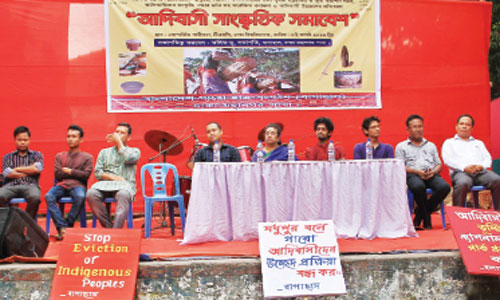Ethnic minorities fear eviction in Madhupur
Ethnic minorities are in fear of eviction following a gazette notification issued declaring 9,145 acres of Madhupur Forest lands in Tangail reserve forest and have alleged that the government has made the decision keeping them in dark.
Their leaders said that the government made the decision without any discussion with the local people only to evict the people living there for decades and it would help forest grabbers.
Local people said about 15,000 to 20,000 people of different ethnic minority groups including Garo, Barman and Koch and some Bengalis were now in fear of eviction from their ancestral lands.
Against this backdrop national minorities are celebrating International Day of the World’s Indigenous Peoples today with a theme ‘indigenous people’s right to education, land and life.’
The government in February issued a gazette notification declaring 9,145 acres of land in Madhupur Garh area ‘reserved forest’ under the Forest Act 1927.
Local people said that government even did not circulate the decision till May 30, when a top forest department official disclosed it addressing a programme in Tangail.
According to Section 26 of the act, any person who trespasses or pastures cattle, or permits cattle to trespass, causes any damage by negligence in felling any tree or cutting or dragging any timber, quarries stone, burns lime or charcoal, or collects, subjects to any manufacturing process or removes any forest produce other than timber or who enters a reserved forest with fire arms without prior permission, shall be punishable with imprisonment for a term which may extend to six months and shall also be liable to fine which may extend to Tk 2,000, in addition to such compensation for damage done to the forest as the convicting court may direct to be paid.
Solakuri union resident Atin Marma, 43, said he was worried about bleak future if the government evicted them from their ancestral land his family would lose right to about 8 bigha lands including his house. ‘My five-member family is dependent on pineapple cultivation, if evicted what we will do,’ he said.
Local Sham Sagore Mankin a Rajshahi University mass communication and journalism final year student said almost all people of Solakuri and Arankhola unions would be affected by the reserve forest. He said if the primary schools and secondary schools were evicted most students would drop out from schools.
Local people said that ethnic minorities started to live in the area at least 100 years ago clearing forests. Beribait Governemnt Primary School was established in 1885 and Bhutia Government Primary School was founded in 1915 and the schools were in the area that was declared reserve forest.
Ethnic minorities have been living in Madhupur forest for ages, in harmony with the environment. Almost all the successive governments tried to evict them without paying attention to their traditional land rights, said local rights organisation Jayanshahi Adibashi Unnoyon Parishad chairman Eugin Nokrek.
This time government declared 9,145 acre land reserve forest without any prior consultation, alleged Atin, Sham and Eugin. They said that they were in panic as they knew that none usually allowed to enter a reserve forest.
Eugin Nokrek said that forests and lands they were living was integral part of daily life of ethnic minorities. Jayanshahi Adibashi Unnoyon Parishad estimates that numerous houses, 50 decades-old establishment, 15 primary and secondary schools and madrassahs, 13 churches, 4 mosques, 2 temples, several kitchen markets fell under the reserved forest.
Bangladesh Adibashi Forum president Jyotirindra Bodhipriya Larma, also known as Santu Larma said that the unilateral decision declaring Madhupur a reserve forest was another example of government’s move to deprive and deceive the ethnic minorities.
‘The anti-people decision of the government would render thousands of indigenous people homeless,’ he said.
Tangail division forest officer Masud Rana said that government declared the area a reserve forest following all legal procedures. ‘Government in 1984 had asked locals to make their claims,’ he said.
‘All establishments in the area are illegal, as they have no legal documents,’ he added.
Masud, however, said that decision of eviction depended on the government.
Against this backdrop national minorities are celebrating International Day of the World’s Indigenous Peoples today as elsewhere across the globe.
Different organisations of ethnic minorities have taken elaborate programmes including rally, discussion and cultural show to mark the day.
Bangladesh Adivasi Forum urged the ethnic minorities to observe the day this year with the theme ‘Indigenous people’s rights to education, land and life.’
Right activists Sultana Kamal and Elsa Stamatopoulou of the Chittagong Hill Tracts Commission, an international watchdog on CHT affairs, in a joint statement expressed deep concern over arbitrary eviction of the indigenous people in the country. They urged the government to implement the National Education Policy 2010 fully to ensure mother-tongue based education for al ethnic minorities.
News Courtesy: www.newagebd.net











